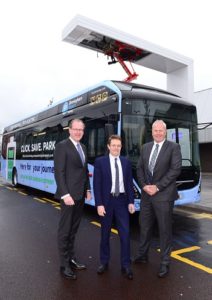Leading the way with new electric bus fleet.
Birmingham Airport has launched a fully electric bus fleet to replace the current diesel vehicles in operation – the first UK airport to implement the ultra-low emission buses.
Andy Street, Mayor of the West Midlands was in attendance at the launch, highlighting the benefits of green transport in improving air quality across the region.
Operating as a free passenger service via all landside car park routes, the new fleet is made up of six 7900e single deck electric buses supplied by Volvo Bus UK, providing an 80% lower energy consumption than the equivalent sized diesel bus.
An investment of £1.8 million was made by the airport, with an additional grant of £1.4 million provided by the Department for Transport under its Ultra Low Emission Bus Scheme.
The decision to introduce the electric fleet came as a result of a review undertaken by the airport into its future vehicle provision and recently announced commitment to become a net zero carbon airport by the year 2033 – ahead of the UK’s 2050 target.
To ensure the bus operation is available 24/7, each bus will be recharged whilst in service using the OppCharge opportunity charging pantograph system. Two charging points have been installed outside of the terminal, taking up to six minutes to complete charging, giving flexibility whilst also enabling continuous operation. Additional plug-in charging points are located in the coach park. Plans have also been put in place to make the charging points available for future use by public electric bus and coach operators.

Nick Barton, CEO of Birmingham Airport said: “I’m extremely proud to say we are the first UK airport to implement a fully electric landside bus service. The buses are not only a big win for us in terms of the reduction in emissions, but they will also contribute to providing an improved passenger experience. The 7900e Volvo UK buses are considerably quieter than the buses we had in use previously and are equipped with location-based passenger updates as well as USB charging built into every seat.
“This is a really exciting time for the Birmingham Airport. Over the next 15 years we are investing significantly to improve our facilities and service for customers, whilst reducing our carbon footprint to reach an ambitious target of net zero carbon by 2033.
“I’d like to thank Volvo Bus UK for supplying the new electric buses and look forward to a greener future at Birmingham Airport.”
Andy Street, the Mayor of the West Midlands, said: “A huge congratulations to Birmingham Airport on the launch of their electric buses. It really is great to see the airport leading the way in the fight against climate change, not only as the first UK airport to implement a fully electric landside bus fleet, but also with its wider commitment to become net zero carbon by 2033. We know around a third of carbon emissions across the West Midlands come from transport, but the good news is that we are making progress to tackle this, with Birmingham Airport’s electric bus fleet a prime example.
“In July of this year, the West Midlands Combined Authority took the step to invite youth climate strikers to our board meeting to discuss the issues around climate change. This meeting led to us declaring a climate emergency in the region, and setting our own West Midlands target of becoming carbon neutral no later than 2041 – nine years ahead of the national target.
“We have a real commitment to change across the West Midlands, with Birmingham Airport paving the way. A big well done to all involved in launching this electric bus fleet.”
Nick Page, Managing Director of Volvo Bus UK & Ireland, added: “After all the planning during the last 12 months, it is great to see the 7900e going into service at Birmingham Airport, providing a fantastic environmentally friendly bus service for airport customers and stakeholders. This is the first project of its type for the UK with Volvo supplying a turnkey solution delivering the infrastructure and civils in addition to the vehicles.
“Our ongoing vision and goal is to develop a range of vehicles and technologies which include hybrids, and fully electric vehicles, that will lead to better air quality for people living, working and visiting our towns and cities across the UK. These vehicles not only provide ‘well to wheel’ greenhouse gas emissions benefits but also deliver zero tailpipe emissions at the airport.”


